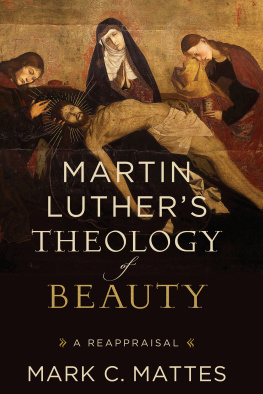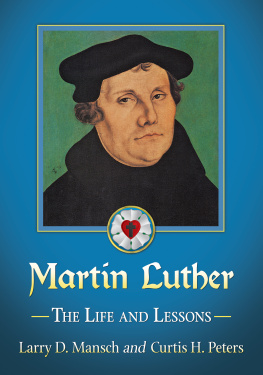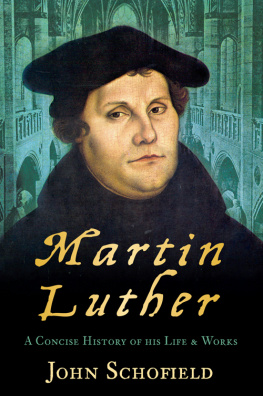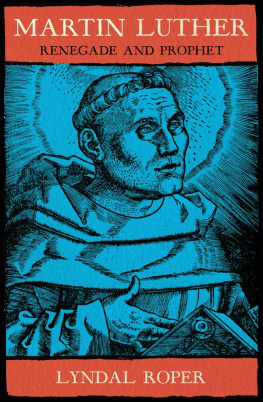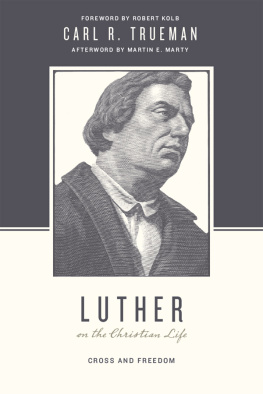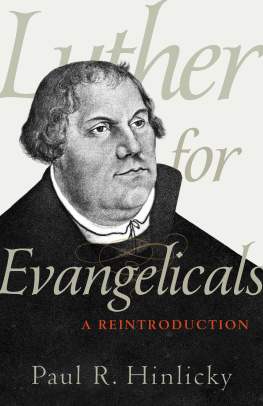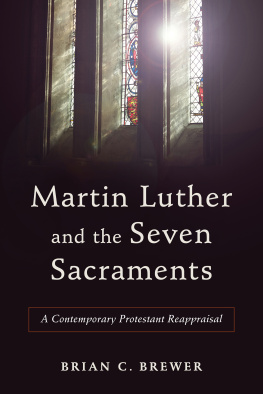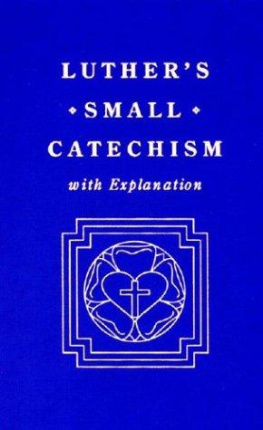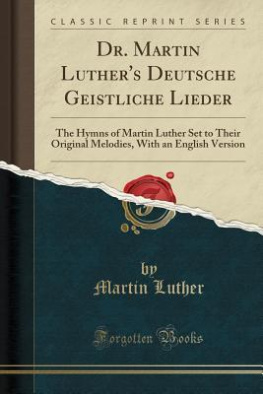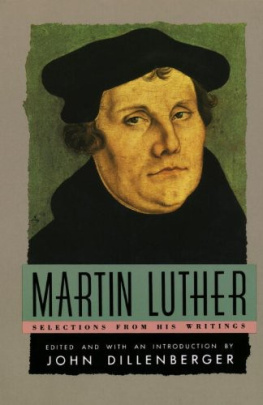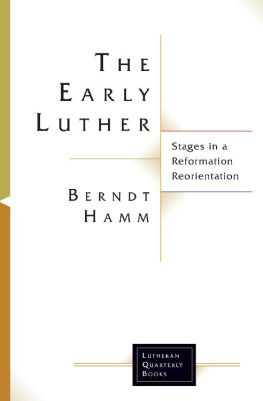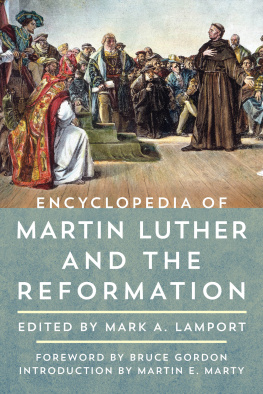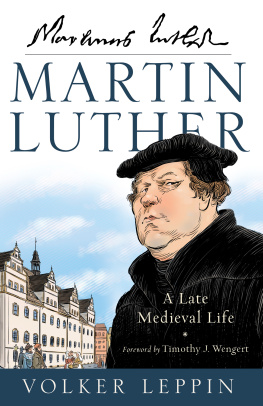Contents
Cover
Title Page
Copyright Page
Dedication
Acknowledgments
Abbreviations
1. Introduction
Foundation in Scripture
Overview of the Book
2. Luthers Use of Philosophy
The Scope of Philosophy in the Late Medieval University
Nominalism and Realism
Luthers Divergences from Nominalism
Aristotles Inadequacies and Adequacies
Early Appropriation of Plato
The Question of Double Truth
Priority of Grammar over Logic
The Semantics of the New Tongue
Conclusion
3. Luther on Goodness
Brief Overview of Medieval Views of Goodness
Justification and Goodness
Omnipotence and Divine Goodness
Goodness as the Heart of God
Comparison with Medieval Perspectives
Conclusion
Proportionality, Light, and Desire
Beauty as a Transcendental
Beauty in the Theology of Humility
Beauty and the Question of Form
Conclusion
5. The Mature Luther on Beauty
Beauty Sub Contrario in Selected Psalms (1530s)
Beauty in the Lectures on Galatians (1535)
Lectures on Genesis (1535 and Following)
Conclusion
6. Luther on the Theology and Beauty of Music
Music as a Creation and Gift of God
Luthers Response to the Ancient Churchs Mixed Reception of Music
Luthers Response to Reformed Reservations about Music
The Affectivity of Music as Embodied Word
Criteria for Beauty in Music
Poetic Summary of Luthers View of Music
Conclusion
7. Luther on Visual Imaging
The Role of Images in the Early Church
Critique of Medieval Veneration of Icons
Critique of Iconoclasm
Word as Portrayal
A Covered God
Conclusion
8. Luther and Nouvelle Thologie
The Ambiguity of the Infinite
An Enchanted World
The Strange Beauty of the Cross
The Goals of the Nouvelle Thologie
The Question of Participation
The Question of Hierarchy
The Question of Pure Nature
Conclusion
Summary of Results
Beauty of Christ, Revisited
Creaturely Beauty, Revisited
God as Beautiful, Revisited
Luther in Contrast to Modern Views of Beauty
The Sublime
Revisiting Form
Beauty and Preaching
Works Cited
Index of Names
Index of Ancient Sources
Index of Subjects
Back Cover
Acknowledgments
T here are many pleasures that come with writing, but the chief one is the fellowship established in the community of scholars that writing facilitates. Writing is solitary, but it is never isolated. Instead, this book, in spite of whatever flaws that may exist in it, has benefited mightily from extensive comments received from Paul Rorem, Robert Kolb, Oswald Bayer, and Steve Paulson. I am grateful for and indebted to the fellowship that exists in and is garnered by the journal Lutheran Quarterly , which the aforementioned friends find as a point of reference for their work in English-speaking circles. I am heartened by and indebted to the many suggestions that these scholars have brought.
This work has benefited as well from a less international but no less important support system: my colleagues and friends at Grand View University, which, professionally speaking, has been my home for over twenty years. Thanks are especially to be given to Ken Sundet Jones, who was often the first to read the pages in this book and who generously and in detail commented on them. Likewise thanks go out to John Lyden and Kathryn Pohlmann Duffy for their critique and support. Sheri Roberts and Cara Stone, Grand View librarians, assisted with providing numerous interlibrary loan resources. Most importantly, I am grateful to the board of trustees of Grand View for granting me a sabbatical in the fall of 2015 for the purpose of finishing this book. In particular, Dean Ross Wastvedt aided in the sabbatical application process. At Princeton Seminary, Mark Dixon was helpful in finding copies of Nicholas of Lyras biblical commentaries, with which I compared Luthers Lectures on Genesis ; Miles Hopgood likewise was helpful in retrieving several important bibliographic references for me. Additionally, John Pless, Oliver Olson, Russ Lackey, Kevin McClain, Roger Burdette, and Mary Jane Haemig provided encouragement and moral support through the writing process. Thanks to my wife, Carol, and children, Joseph, Peter, and Emma, who were patient with me as I carved out time to finish this project. Finally, thanks are due to editors Dave Nelson and Tim West at Baker Academic for shepherding this manuscript through the editorial process and to publication.
A number of these chapters were originally presented orally in various settings, and I wish to acknowledge those institutions that invited me to share this work. Chapter 2 is a revision of Luthers Use of Philosophy, which originally was given as a plenary address to the Twelfth International Luther Congress in Helsinki in August 2012. The substance of chapter 3, Luther on Goodness, was presented in October 2014 during Weekend with the Word, a conference sponsored by the Lutheran Church of the Master, Corona del Mar, California. I am grateful to Pastor Mark Anderson for hosting me at this event. Chapter 4, The Early Luther on Beauty, was presented in a working group at the North American Luther Research Forum held at Concordia Seminary in St. Louis, Missouri, in April 2014. Chapter 6, Luther on the Theology and Beauty of Music, was a keynote presentation for the Vi Messerli Lectures at Concordia University in River Forest, Illinois, in October 2015. Finally, a condensed version of chapters 4 and 5, dealing with both the early and the mature Luther on beauty, was presented at the 2016 Symposium on the Confessions, Concordia Theological Seminary, Ft. Wayne, Indiana, and at the North American Luther Forum held at Luther Seminary in April 2016. Thanks are due to David Scaer for his invitation to lecture in Ft. Wayne and to Mary Jane Haemig for the invitation to present in St. Paul.
Chapter 2, Luthers Use of Philosophy, originally appeared in Lutherjahrbuch 80 (2013): 11041, and is used here with permission. Fortress Press and Concordia Publishing House have kindly granted permission to cite at length from Luthers Works , 55 volumes (Philadelphia: Fortress; St. Louis: Concordia, 195586).

